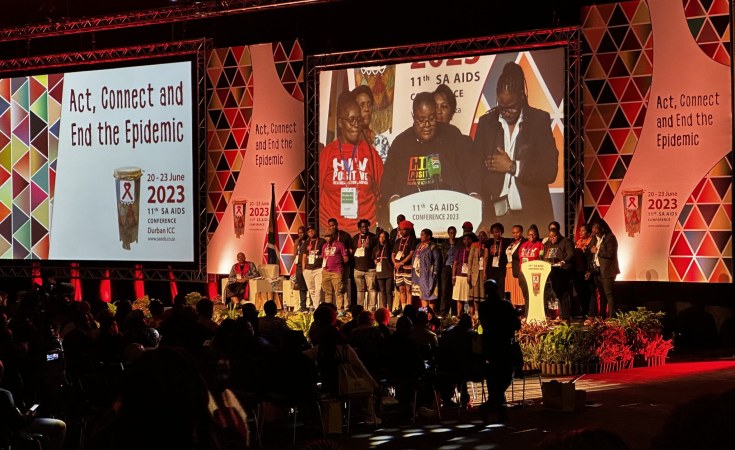Self-testing kits for HIV/AIDS provide the most vulnerable and hardest-to-reach communities with the hope that they will see an end to the spread of HIV by 2030, according to the leaders of one of the world's largest HIV programmes. This includes transgender people, incarcerated people, sex workers, and people who inject drugs.
Dhirisha Naidoo, a senior public health implementation leader in the BroadReach Health Development, and her colleague, Silinganiso Chatikobo, an HIV testing specialist, presented on the topic of HIV 'self-testing', also known as self-screening', at the SA AIDS Conference in Durban this week.
Naidoo oversees BroadReach's part of the PEPFAR-funded USAID programme called APACE - one of the largest HIV/AIDS treatment and care programmes in the world, in KwaZulu-Natal and Mpumalanga in partnership with the Department of Health. Chatikobo is a specialist technical advisor on HIV testing services and linking in the programme. BroadReach has worked in HIV and AIDS management for 20 years in more than 30 countries in partnership with governments and donors. Its founders are among the top independent public health experts in the world, with experience serving on the World Economic Forum's Schwab Foundation for Social Entrepreneurship board and having advised several governments including South Africa's and the White House on the management of epidemics like HIV/AIDS and COVID-19.
What to do about HIV as we get close to the finish line
"As a country, South Africa is close to reaching the 95% target of everyone living with HIV knowing their status. As a result, we have now reached a point where we need to be deliberate about case finding. The mission now involves finding the harder-to-reach and more vulnerable HIV communities – to deliver the last mile of testing and treatment - and it's not as easy as it was in the earlier days of HIV when all programmes were designed for mass reach," says Chatikobo.
This approach requires more targeted programmes and allocation of resources. It also requires the careful targeting and engagement of the most vulnerable and hard-to-reach HIV communities. These populations are typically the most marginalised and weary of coming into public health facilities, and therefore make up the bulk of the under-tested, yet most in-need population for testing. Other high-priority populations are male and female young people, migrant populations, truck drivers, and men in general, because of their common reluctance to seek medical help.
"As a result, there is a push from both the Department of Health and BroadReach to increase the number of facilities across all districts that distribute self-screening kits to improve access to a wider number of the under-tested population," says Naidoo. "We collaborate with community healthcare workers to distribute HIV self-screening kits and to support clients with active linkage to care thereafter."
Why some populations are harder to reach, and strides being made
Chatikobo explains that there are several reasons why certain population groups are more challenging to reach. "Long-standing issues of stigma and discrimination in our communities and health facilities make it harder for people to get tested and treated for HIV. It's also challenging when people live in hidden communities, have migratory economic and social lifestyles, and when society still has some way to go in addressing problematic social norms and perceptions of sexual and reproductive health issues."
Despite health access and reach challenges, both Chatikobo and Naidoo are optimistic. "We've thankfully reached a point where there is more cause to celebrate than to worry about the uptake of self-testing," says Chatikobo.
"Since our pilot phase, there has been an increase in the number of clients receiving testing kits and using them. The number of facilities that are distributing testing kits has increased and there is also an increase in supply of the kits by both USAID and the Health Department."
One "minor concern" is around clients that receive testing kits through secondary distribution, but do not immediately contact healthcare facilities with their screening outcomes. "This inevitably delays appropriate linkage to care," says Chatikobo, whose role involves managing the process of linkage to care in health facilities.
Next steps
Naidoo says HIV self-testing is an important strategy to support the ending of HIV/AIDS by 2030. "Self-testing provides opportunities for clients to know their HIV status and link to relevant care thereafter, and if their contacts are traced, it helps us provide more prevention and treatment for additional community members."
The next step is to intensify testing strategies such as index testing services, testing clients that have been identified as having tuberculosis, sexually transmitted illnesses, and sexually active clients who prefer other family planning methods that are not barrier methods, says Chatikobo.
"Clients identified as living with HIV need to be retained in care so that we can ensure they reach a level of viral suppression that minimises further transmission. Also, clients at risk of HIV infection should be afforded opportunities to take all prevention strategies that are available, which may include preventative medications."
BroadReach supports four of the most highly affected HIV districts in the country, Gert Sibande and Nkangala in Mpumalanga and Ugu and King Cetswayo in KwaZulu-Natal, with staff working alongside the Department of Health facilities to support direct service delivery. Technical support is also provided across the HIV cascade to the Department of Health. This work is made possible by PEPFAR and USAID and is strategically important in the global mission to end HIV by 2030.


